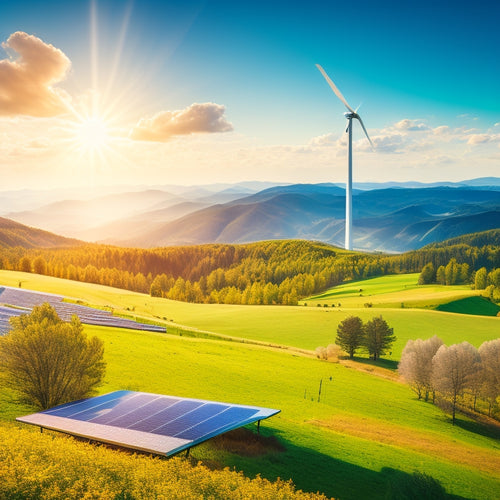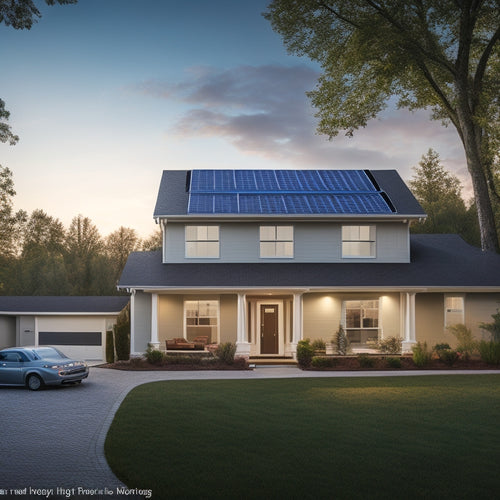
Benefits of Energy Inverters in Off-Grid Applications
Share
Energy inverters are crucial for off-grid applications, giving you reliable and flexible energy management. They optimize power usage from renewable sources, ensuring you maximize efficiency and minimize energy loss. With features like real-time monitoring, you can adapt to changing demands while supporting essential loads during peak times. These inverters come in various customizable installations, making them suitable for any setup. Plus, their low maintenance requirements mean less downtime and increased durability. By choosing the right inverter, you enhance your energy independence and sustainability. Uncover how these benefits can reshape your off-grid experience even further.
At a Glance
- Energy inverters optimize the use of renewable sources, enhancing energy independence and reliability in off-grid systems.
- They provide versatile installation options, accommodating various space constraints and power needs for customized setups.
- High efficiency ratings (>95%) reduce energy loss during conversion, maximizing available power for off-grid applications.
- Real-time monitoring and smart technology enable effective energy management, ensuring critical loads are prioritized during peak demand.
- Lower maintenance requirements contribute to reduced wear and tear, leading to long-term savings and increased system durability.
Reliable Power Source Flexibility
When you're relying on off-grid power, having a flexible energy source is essential.
Energy inverters enhance your energy management by allowing you to adapt to varying power needs and conditions seamlessly.
By integrating multiple renewable energy sources, such as renewable innovations, you can further optimize your energy independence.
Plus, their versatile installation options mean you can customize your setup to fit your specific environment and requirements.
Enhanced Energy Management
In off-grid applications, enhanced energy management is essential for maintaining a reliable power source, and energy inverters play an important role in this process. These devices allow you to optimize energy usage, ensuring that you utilize every bit of power generated from renewable sources like solar and wind.
By integrating energy inverters, you create a smarter system that can adapt to varying energy demands and environmental conditions. With advanced features, energy inverters facilitate seamless renewable integration, connecting your off-grid setup to a smart grid when needed.
This flexibility means you can draw power from the grid during peak generation times or store excess energy for later use. You gain the freedom to manage your energy resources effectively, ensuring you're never left in the dark.
Moreover, energy inverters enhance the reliability of your system by providing real-time monitoring and analytics. You'll be able to track energy consumption patterns and make informed decisions about energy use, thereby increasing efficiency and reducing waste.
This enhanced energy management ultimately enables you to achieve greater independence and sustainability in your off-grid lifestyle.
Versatile Installation Options
Energy inverters offer impressive versatility in installation options, allowing you to customize your off-grid power system to fit specific needs and locations. Whether you're working with limited space or unique environmental conditions, you can choose installation techniques that maximize efficiency and performance.
Consider the following table showcasing various installation options for energy inverters:
| Installation Technique | Ideal Scenario |
|---|---|
| Wall-mounted | Limited space constraints |
| Rack-mounted | Larger setups or systems |
| Portable units | Temporary or mobile applications |
This flexibility means you don't have to compromise on your power supply, enabling you to utilize renewable energy effectively. For instance, if you're in a tiny home or a remote cabin, wall-mounted options keep your inverter out of the way while still providing reliable energy. Conversely, rack-mounted systems can cater to larger needs, ensuring you have adequate power for all your devices.
When freedom is your goal, these versatile installation options allow you to create a customized energy solution that fits your lifestyle and environment. Don't settle for one-size-fits-all; choose the right installation technique to enhance your off-grid experience.
Enhanced Energy Efficiency
When you implement energy inverters in your off-grid setup, you'll notice a significant reduction in energy loss.
These devices optimize resource management by converting and utilizing energy more efficiently, ensuring you get the most out of every watt produced.
Advanced inverter technology enhances system performance and stability, allowing for better energy flow to batteries and appliances.
Reduced Energy Loss
While many off-grid systems struggle with efficiency, employing energy inverters can greatly reduce energy loss. These devices play an essential role in minimizing energy waste by converting direct current (DC) from renewable sources like solar panels into alternating current (AC), which is vital for most household appliances.
When you tap into the power of energy inverters, you're not just optimizing your system's performance; you're also guaranteeing that every watt of energy generated is used effectively.
In an off-grid setup, energy loss can considerably impact your independence and sustainability goals. Energy inverters enhance energy efficiency by regulating voltage and current, allowing for smoother operation and reducing the likelihood of energy dissipation.
With advanced features like maximum power point tracking (MPPT), these inverters assure your renewable energy systems operate at peak performance, capturing the maximum energy output available.
Optimal Resource Management
Ideal resource management in off-grid applications hinges on the strategic deployment of energy inverters, which streamline the utilization of available energy. By effectively managing resource allocation, these devices enhance your system's capacity to convert and store energy, ensuring that every watt counts.
With energy optimization at the forefront, you can utilize renewable sources like solar or wind more efficiently, reducing waste and maximizing output.
Energy inverters allow you to monitor and regulate power usage in real-time, enabling you to make informed decisions about your energy consumption. This level of control means you can prioritize essential loads, ensuring that critical systems remain operational even during peak demand times.
Moreover, by integrating smart technology with your inverter system, you can automate energy distribution, further enhancing efficiency. This capability not only equips you with greater independence but also aligns with a sustainable lifestyle, reducing your reliance on external power sources.
In essence, effective resource management through energy inverters not only supports your off-grid ambitions but also cultivates a more resilient, self-sufficient energy ecosystem, giving you the freedom to live and thrive on your terms.
Key Technical Specifications
When selecting an energy inverter for your off-grid application, understanding output power capacity and efficiency ratings is vital.
These specifications directly impact your system's performance and overall energy sustainability. Choosing a high-efficiency inverter (>95%) can greatly enhance energy harvesting and reduce losses, which is important for key components of off-grid solar systems.
Knowing how to assess these key factors can guarantee you choose an inverter that meets your specific power needs effectively.
Output Power Capacity
Output power capacity is a crucial specification in energy inverters, especially for off-grid applications where reliability is paramount.
You'll want to carefully consider the power ratings of the inverter types available to guarantee they meet your energy needs. The output power capacity determines how much electrical load you can support simultaneously, making it indispensable for both everyday tasks and emergency situations.
When selecting an inverter, look for one that offers sufficient capacity to power your appliances, tools, and other devices without overloading.
For instance, if you plan to run a refrigerator, lights, and power tools simultaneously, you'll need an inverter with a higher output power capacity.
Understanding the difference between inverter types—such as pure sine wave versus modified sine wave—can also influence your decision, as these types deliver power differently and impact the efficiency of your devices.
Efficiency Ratings
Efficiency ratings are vital for understanding how well an energy inverter converts DC power from batteries into usable AC power for your devices. Higher efficiency means less energy loss during the energy conversion process, which translates to more power available for your needs.
For off-grid applications, where resources are often limited, choosing an inverter with a high efficiency rating is essential.
Different inverter types, such as pure sine wave and modified sine wave inverters, have varying efficiency levels. Pure sine wave inverters typically offer superior efficiency, making them ideal for sensitive electronics, while modified sine wave inverters may suffice for less significant devices.
Knowing the efficiency rating of your chosen inverter can help you maximize your energy resources, ensuring you maintain independence from the grid.
When you're investing in an energy inverter, look for those with efficiency ratings above 90%. This benchmark indicates that the inverter is capable of performing at its best, minimizing waste.
Selecting Based on Power Output
When selecting an inverter for your off-grid application, you need to carefully consider the power rating to guarantee it meets your energy demands.
Evaluating your load requirements is essential, as it determines the inverter's capacity to handle all appliances efficiently.
Additionally, understanding the energy needs associated with your lifestyle can help you make an informed decision that aligns with your consumption patterns, especially when considering options like energy needs assessment.
Power Rating Considerations
Selecting the right power rating for your energy inverter is essential to ensuring your off-grid system meets your specific energy needs. When considering inverter sizing, it's imperative to evaluate both your average and peak demand. Your inverter mustn't only handle the continuous load but also accommodate short bursts of high energy usage that can occur when appliances start up.
To start, calculate the total wattage of all devices you plan to run simultaneously. This total will help you determine the minimum power rating your inverter needs. However, don't overlook peak demand; some devices may require considerably more power at startup. For instance, a refrigerator may need double its running wattage for a few seconds when it kicks on.
Choosing an inverter with a power rating that exceeds your calculated needs provides a buffer, ensuring reliable performance without the risk of overload.
You'll want to prioritize freedom and reliability in your off-grid lifestyle, so investing in the right inverter is essential. By carefully considering your power output requirements and selecting an appropriately rated inverter, you can achieve the energy independence you desire.
Load Requirements Assessment
Evaluating load requirements is essential for optimizing your off-grid energy system. To guarantee you choose the right energy inverter, you'll need to conduct a thorough load capacity evaluation. This involves identifying all the devices you'll be using and calculating their cumulative power demands.
Consider continuous loads, like refrigerators or water pumps, and peak loads, which may occur during startup for appliances such as air conditioners or power tools.
Energy demand forecasting is vital in this process. By analyzing your daily and seasonal energy needs, you can anticipate fluctuations in energy consumption.
This foresight allows you to select an inverter that not only meets your current demands but can also accommodate future growth—making sure your system remains sturdy and adaptable.
Lower Maintenance Requirements
When you choose energy inverters for off-grid applications, you greatly reduce wear and tear on your system.
These inverters are designed to efficiently convert energy with minimal mechanical stress, which means less frequent repairs and replacements.
Ultimately, this leads to lower maintenance requirements, saving you both time and money in the long run.
Reduced Wear and Tear
Because energy inverters play an essential role in off-grid applications, they greatly reduce wear and tear on your overall system. By efficiently converting DC to AC power, inverters help maintain the stability of your electrical system, minimizing the stress on components. This stability enhances component durability, ensuring that your equipment can withstand the rigors of off-grid living.
When you rely on energy inverters, you're not just investing in power conversion; you're also greatly extending the operational longevity of your entire setup. Inverters reduce fluctuations and imbalances that can lead to premature failure of batteries and other critical components.
With less strain on your system, you're likely to experience fewer breakdowns and repairs, ultimately saving you time and money.
Moreover, the reduced wear and tear means you can enjoy the freedom of off-grid living without constant interruptions for maintenance. By choosing quality energy inverters, you're taking a proactive step toward a more reliable and efficient power source.
This choice enables you to focus on what truly matters—living freely and sustainably, without the burden of frequent upkeep.
Frequently Asked Questions
Can Energy Inverters Be Used With Renewable Energy Sources?
Yes, energy inverters can absolutely be used with renewable energy sources. Their inverter compatibility guarantees seamless renewable integration, allowing you to utilize clean energy efficiently and enjoy the freedom of sustainable power solutions customized to your lifestyle.
What Is the Lifespan of an Off-Grid Energy Inverter?
The lifespan of your off-grid energy inverter typically ranges from 5 to 15 years. Regular inverter maintenance and ideal inverter efficiency greatly influence longevity, ensuring you maximize your investment and enjoy sustainable, independent energy usage.
How Do I Troubleshoot Inverter Issues?
To troubleshoot inverter issues, check for inverter overload and guarantee battery compatibility. If problems persist, inspect connections, reset the system, and consult the manual. Taking these steps can restore your freedom in off-grid living.
Are There Specific Brands Recommended for Off-Grid Use?
When exploring brand comparisons, consider features like efficiency, durability, and warranty. Brands like Victron and Outback stand out for off-grid use, offering reliable performance you can count on for your freedom and energy independence.
How Do Energy Inverters Affect Battery Life?
Energy inverters greatly impact battery life through effective battery management. By ensuring ideal inverter efficiency, you maximize energy use, reduce strain on batteries, and extend their lifespan, giving you the freedom to enjoy reliable, off-grid power.
Explore More
In off-grid applications, energy inverters are like the backbone of your power system—supporting everything with reliable energy and flexibility. Just as a sturdy bridge connects two sides of a river, these inverters guarantee your devices run smoothly and efficiently. With lower maintenance requirements and impressive energy efficiency, you're not just investing in power; you're investing in peace of mind. By choosing the right inverter, you're building a sustainable future, free from the constraints of traditional energy sources.
Related Posts
-

Renewable Energy Solutions to Reduce Your Carbon Footprint
To reduce your carbon footprint, adopting renewable energy solutions is key. Using solar panels or wind turbines can ...
-

Top 10 Off Grid Camping Gear Must-Haves
When you're off-grid camping, the right gear is crucial for a smooth expedition. Start with a durable, weather-resist...
-

Cost of Solar With Battery Backup
You're investing in a solar panel system with battery backup to guarantee reliable power during outages. The cost of ...


